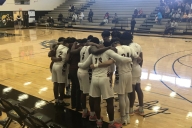You have /5 articles left.
Sign up for a free account or log in.
It was the sort of headline that jumps off the page: “56 percent of Baylor students have experienced sexual harassment by a faculty member, per report.”
In an era of inflamed interest spurred by Me Too and the lightning-quick spread of information (valid and not) through social media, a Fort Worth Star-Telegram article published Wednesday based on misinterpreted data drew national attention as other journalists and many others spread the word about it on Twitter. The article pulled from a Big 12 Conference report that used misinterpreted data from a 2017 Baylor University campus climate survey.
The problem is, the statistic is flat out inaccurate, and the incident shows how quickly misinformation can spread when it aligns with popular narratives.
The situation unfolded in the wake of the Big 12 Conference's Tuesday decision to endorse a third-party report that assessed how Baylor had responded to a 2016 sexual assault scandal involving athletes. The league was deciding whether the university should be reinstated into the league's revenue-sharing program, from which it had been suspended.
The Big 12 report inaccurately stated that “Climate Survey results indicate that 56% of Baylor students have experienced sexual harassment by a faculty member that involved sexist or sexually offensive language, gestures, or pictures.”
In fact, 31 percent of student respondents in the 2017 social climate survey indicated that they had experienced sexual harassment by a faculty member, instructor or staff member in the form of “sexist gender harassment,” which was defined in the survey as “situations in which a person: treated you ‘differently’ because of your sex; Displayed, used, or distributed sexist or suggestive materials; Made offensive sexist remarks; or Put you down or was condescending to you because of your sex.”
This definition, Baylor University officials clarified, could include remarks like “she looks nice,” “I like her haircut” or “she runs like a girl” and does not include attempts by a faculty or staff member to establish a romantic or sexual relationship with the student or unwanted touching, which fall into other categories including "crude gender harassment" and "unwanted sexual attention."
Of those 31 percent, the social climate survey found, 56 percent said that “the situation that had the greatest effect on them involved sexist or sexually offensive language, gestures, or pictures” and 3 percent “indicated that the situation involved subtle or explicit bribes or threats.”
Lori Fogleman, assistant vice president of media and public relations at Baylor, said that after discussions with the Big 12 office, the university determined that "during the verification process, Baylor provided the Big 12 with a summary list of accomplishments and activities following the university’s 2017 climate survey that failed to summarize the survey results completely and accurately." In other words, Baylor appears to have provided the flawed data to the Big 12.
Fogleman issued the following statement to Inside Higher Ed.
“A point in the Big 12’s ‘Report on Verification of Implementation of 105 Recommendations by Baylor University’ -- amplified this morning by the Fort Worth Star-Telegram -- contains a gross mischaracterization of the results of the university’s publicly available campus climate survey,” the statement read in part. “The 56 percent number actually refers to 56 percent of this 31 percent -- in other words, roughly 17 percent of respondents to this specific question. While 17 percent is still an unacceptable number -- and Baylor is working to improve the behavior that would cause this -- it is a far cry from 56 percent of Baylor’s entire student body.”
The aforementioned article in the Star-Telegram has been shared by many users on social media, including several national journalists. The story has not been removed or corrected, but a follow-up article about the Big 12’s error was published Wednesday afternoon.
The reporter, Mac Engel, has taken some heat on Twitter for failing to check the statistic against the original social climate survey.
“Shouldn't you have maybe looked into the stat just a little bit before publishing it? Kind of a big mistake there, big guy,” one user tweeted.
For the most part, Engel has pushed responsibility for identifying the false statistic on Baylor and the Big 12 Conference.
“Champ, are you talking to me or the law firm that Baylor paid $1.6 million to do this investigation and write this report? Or the Big 12 that sent it out?” he tweeted in reply to the user above.
Bob Burda, the associate commissioner of communications for the Big 12 Conference, said that he reached out Polsinelli PC, the third-party law firm that produced the report and redirected requests for comment to Baylor University.
The Big 12 Conference endorsed the report because it showed that Baylor had implemented over 100 recommendations made by Pepper Hamilton -- the law firm that investigated the 2016 sexual assault scandal -- to improve how the university investigates and adjudicates claims of sexual assault.
According to the Star Tribune, the Big 12 Conference will no longer withhold a share of Baylor’s conference revenue. Of the $14.3 million that has been withheld over the past two years, Baylor will be fined $2 million, $1.65 million will cover legal costs and the remaining $12.6 million will be invested.








